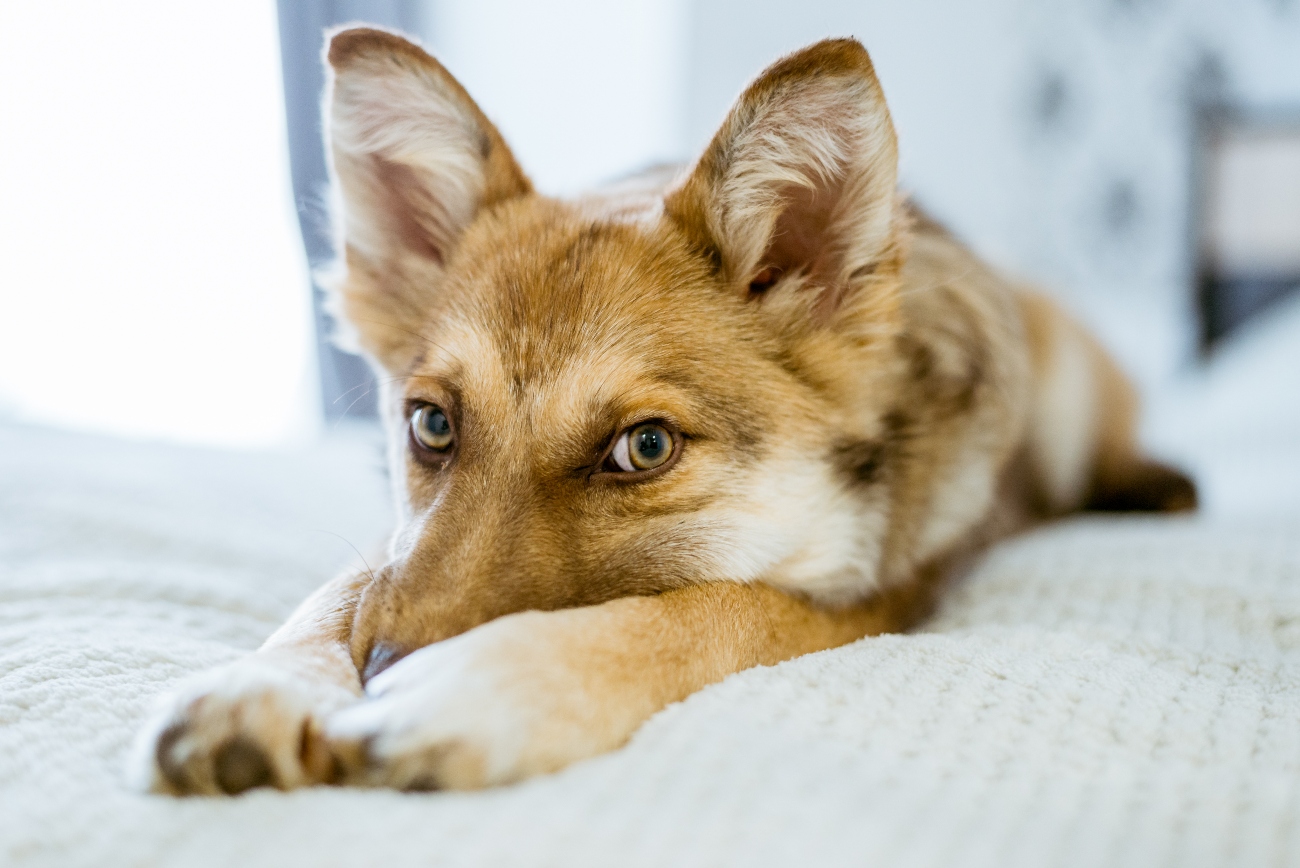Why is my dog jumpy? Understanding the mystery of your pet's anxious behaviour
3rd November, 2023

Many pet owners frequently find themselves asking, "Why is my dog jumpy?" Suddenly, your once calm and composed canine companion starts exhibiting signs of fear, anxiety or hyperactivity seemingly out of the blue.
As responsible dog owners, it's important to understand the root causes behind this unusual behaviour and how we can help our furry friends navigate through these challenging situations.
This article aims to delve deep into the reasons why your dog might be displaying jumpy behaviour and provides insightful guidance on how to help them.
Understanding fear and phobia in dogs
Dogs, much like humans, can develop fears or common phobias due to certain negative experiences in their past. These fears can manifest when they encounter specific triggers, leading to jittery and anxious behaviour.
For instance, a dog that has had a traumatic experience walking through a specific door or getting into a car may develop a phobia related to these situations.
Identifying fearful behaviour
Fear in dogs can manifest in various ways. Some dogs might only exhibit fear in specific situations, while others might be persistently jittery. Common signs of fear in dogs include:
- Trembling or shivering
- Cowering or hunched body posture
- Ears held back
- Tail tucked under
- Hair standing up on the neck and back
- Growling or showing teeth
- Licking their lips repeatedly
- Panting heavily
- Attempting to escape or hide from the perceived threat
It's important to remember that if your dog's jittery behaviour is out of character, they may be showing subtle signs that they're either ill, in pain, or dealing with a fear or phobia.
Why is my dog flinching all of a sudden?
This sudden behaviour change can be quite alarming for any dog owner. Flinching in dogs is usually a fear response to pain or discomfort, but it could also indicate a sensory or neurological issue.
If your dog has recently started flinching, it may be due to a physical injury or illness that is causing discomfort.
This could range from something minor like a tick bite or ear infection, to more serious conditions like arthritis or neurological disorders. Emotional distress can also cause a dog to flinch.
Dogs may exhibit this behaviour when they are anxious, scared, or have suffered some form of trauma. It's also possible that this is your dog's reaction to certain sounds or stimuli in their environment that they find threatening or hurtful.
Whatever the cause, it's crucial to consult with a vet to identify the root of the problem and ensure your furry friend gets the care they need.
Why is my dog suddenly so skittish?
The sudden onset of skittishness in your dog could be attributed to a variety of reasons. Dogs are sensitive creatures and their behaviour can change dramatically when they are under stress or experiencing discomfort.
It's possible that a recent event or situation has triggered fear or anxiety in your pet. This could be something as simple as a loud noise, a new person or pet in the home, or a change in their routine.
The impact of negative past experiences
Negative past experiences can have a profound impact on a dog's behaviour. Dogs that have been mistreated, either physically or emotionally, may develop fear and anxiety, leading to jittery behaviour.
Traumatic experiences, such as accidents, fights with other dogs, or severe punishments, can trigger anxiety in dogs every time they encounter a similar situation.
Dealing with past trauma-induced Fear
Understanding what triggers your dog's fear is the first step in helping them manage their anxiety.
Be a strong and reassuring leader for your dog, especially when confronting these triggers.
Keep the situation upbeat and positive, so your dog learns that they're safe with you, even when confronted with reminders of their past experiences.
The role of socialisation
Proper socialisation is crucial for your dog's overall behavioural development. Puppies need to be exposed to diverse environments, other animals, and various people to learn appropriate behaviour.
Dogs that aren't properly socialised by 14 weeks of age can become jittery around unfamiliar people, places, and dogs.
The importance of early socialisation
Your dog's breeder has the responsibility of beginning the socialisation process from birth. This includes daily handling of puppies to familiarise them with human touch and scent.
Once the puppy is in your care, the socialisation process becomes your responsibility. If not adequately socialised, a dog may display jittery behaviour due to unfamiliarity with new experiences.
Separation anxiety: A common cause of jumpy behaviour
Separation anxiety is another common reason why your dog may act jumpy. This condition is characterised by extreme distress when the dog is left alone or separated from its owner.
Dogs with separation anxiety might exhibit some destructive behaviour such as excessive barking, destruction of property, and attempts to escape.
Managing separation anxiety
Dealing with a dog suffering from separation anxiety can be a challenging task. Most dogs with this condition will benefit from working with a professional dog trainer.
Implementing a routine, providing ample physical and mental stimulation, and gradually desensitising the dog to being alone can significantly help manage separation anxiety.
Illness or pain: Potential triggers for jumpy behaviour
Dogs may also act jumpy if they are ill or in pain. Unfortunately, dogs can't communicate their discomfort directly to us.
However, changes in their behaviour, such as sudden jitteriness, might be indicative of underlying health problems.
Identifying signs of illness or pain
If your dog is not normally jittery and suddenly starts displaying anxious behaviour, it's a good idea to monitor them closely for other signs of illness or pain. These might include:
- Lack of appetite
- Lethargy
- Excessive panting
- Changes in sleep patterns
- Reluctance to participate in activities they usually enjoy
If you suspect your dog is in pain or ill, promptly consult your veterinarian.
Sensory impairments: Hearing or vision loss
Impairments in hearing or vision can also cause jumpy behaviour in dogs. If your dog is unable to see or hear clearly, they might easily get startled, leading to a heightened state of anxiety.
Dealing with sensory impairments
Regular vet check-ups are crucial to identify any potential sensory impairments early on. If your dog is diagnosed with a hearing or vision impairment, you can help them adjust by making certain modifications to your routine and environment.
For instance, approaching them slowly and with heavy footsteps can alert them of your presence and decrease the chances of them getting startled.
The influence of genetic predispositions
Just as genetic factors influence human behaviour, they can also play a significant role in a dog's temperament.
Some dogs naturally are more anxious or nervous than other breeds, and this can manifest as jumpy behaviour.
Dealing with noise phobias
Noise phobia is a common issue that can make your dog jumpy. Sudden, loud noises such as fireworks, thunderstorms, or sirens can trigger fear and anxiety in dogs.
Helping your dog overcome noise phobia
Desensitisation techniques can help your dog overcome their fear of loud noises.
Start by playing a recording of the loud noise at a low volume and rewarding your dog for remaining calm.
Gradually increase the volume over several proper training sessions, being careful not to push your dog beyond their comfort zone.
The impact of age-related changes
As dogs age, they experience various physical and cognitive changes that can affect their behaviour.
Older dogs might experience a decline in their sensory abilities, leading to increased anxiety and jitteriness.
In some cases, senior dogs might also develop canine cognitive dysfunction (CCD), a condition similar to Alzheimer's in humans, which can cause disorientation and anxiety.
The importance of pet insurance
Helping your dog overcome their jittery behaviour often involves veterinary consultations, behavioural therapy, and potentially, medication. These costs can quickly add up, which is why having pet insurance can be a lifesaver.
Pet insurance can help cover the costs of veterinary care and treatments, ensuring that your pet gets the help they need without causing you financial stress. It must be mentioned that behaviour is only covered on our policies once they have been in force for 24 months.
To get a dog insurance quote for your furry friend, you can get in touch with us on 0330 102 5748 or get a quote through our website.
Final thoughts

Understanding "why is my dog jumpy all of a sudden?" can be a complex process. It requires careful observation, understanding your dog's body language, and potentially seeking professional help.
However, by addressing the underlying cause of their jittery behaviour, you can help your dog feel more secure and comfortable in their environment.
Remember, patience is key. It might take time for your dog to overcome their fears, but with your love and support, they can regain their confidence and live a happy, fear-free life.
Helpful Pages
Recent Posts
Pet Insurance Quote
- 98% claims paid *
- Claims paid directly to vets
- 24/7 vet video consultations
- Interest free monthly payments




